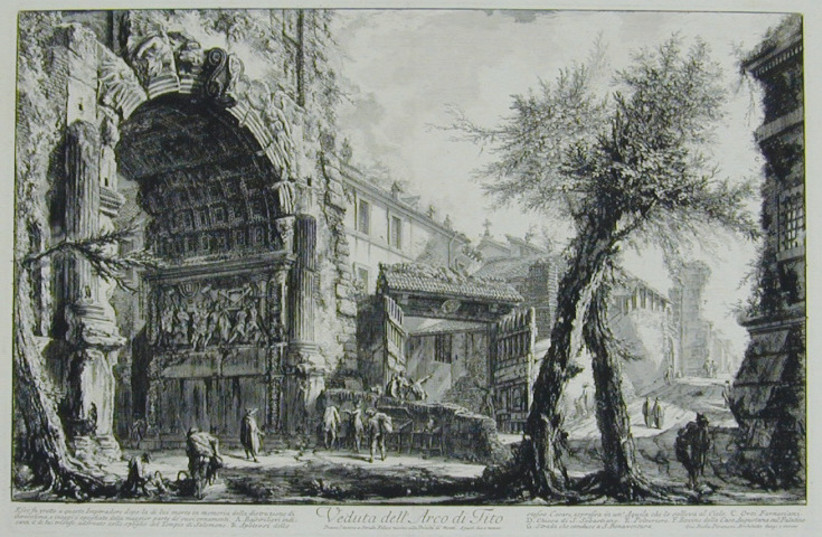Last week, I had the opportunity to visit the world-famous Arch of Titus for the first time as I traveled to Rome for the wedding of my close friend’s daughter. Rome wasn’t built in a day – the saying goes, but it was built from the spoils of a vanquished and plundered Jerusalem.
As I saw with my own eyes Rome’s acclaimed monuments, I couldn’t help but think: “If the ancient marble stones of the grand Colosseum could talk, they would describe the painful humiliation and torture of the Jewish people of the ancient past.”
The Arch of Titus’s famed etchings depict the “capture of Judea,” showing Jewish slaves forcefully shackled in chains and dragged into captivity carrying the menorah back to Rome. Another mural shows Titus celebrating the razing and ransacking of God’s holy Temple in Jerusalem by proudly riding his grand chariot to victory.
One can only imagine the cheers and jeers of the ancient world, “Jerusalem is destroyed! The Jews have been finally defeated!” Rome’s conquest of our people seemed complete and our people’s demise imminent.
How bleak, how depressing.

But then you realize that despite the ominous and repeated threats to our survival throughout our history, we Jews are the ones who have survived and who’ve gloriously returned to our homeland. Titus has been cast into the dustheap of history and is nothing more than a pathetic memory of the past.
Why do I bring all this to your attention?
On this day, July 9, the world marks the 30th yahrzeit of the Lubavitcher Rebbe, who dedicated his life to the spread of Judaism, Torah, and living with purpose. Every corner of the world is alive with Judaism because of the rebbe’s tireless work and spiritual innovations.
Just like Edison lit up the world with light bulbs and power plants, the rebbe set the world ablaze with the flames of Yiddishkeit through his teachings and his emissaries around the world. I am humbled that my family and I are a part of the rebbe’s “army of love” at our post in Columbus, Ohio.
As I stood next to the Arch of Titus and took note of how far we’ve come since the humiliation of millennia past, an Israeli soldier in training was also standing at the arch. Months away from enlisting in the IDF, 19-year-old Oren from Petah Tikva asked his father to take him on a trip to Italy to get inspired before beginning his basic training.
By a remarkable divine coincidence, known in Hebrew as hashgacha pratit, Oren’s family and I found ourselves at the arch at the exact same time. Always ready to carry out the rebbe’s marching orders, I wrapped tefillin with Oren just steps away from the Arch of Titus, within eyeshot of the portrait depicting our ancestors’ ancient defeat.
THIS SIMPLE moment, where two Jews came together to do a mitzvah, captures the essence of the rebbe’s work. Born in 1902 in Nikolaev, Ukraine, the rebbe fled Nazi-occupied Europe for America in 1941, before settling in the Crown Heights section of Brooklyn. After taking up the mantle of leadership in 1950, the rebbe expanded Chabad-Lubavitch’s outreach, turning the movement into the world’s most dynamic force for spreading and fostering Jewish life.
While Chabad is known today for its over 5,500 educational, religious, and social institutions in more than 100 countries around the world, the way in which this growth proceeded is a testament to the rebbe’s remarkable insight and love for each human being.
Rather than emphasizing rapid growth through building large and towering institutions, the rebbe sought to spread Judaism’s warmth and kindness one mitzvah at a time. Whether it’s lighting Shabbat candles, giving a coin to charity, or putting on tefillin, the rebbe understood that each action is infinitely important and that the world is changed one loving interaction at a time.
That’s why my meeting with Oren at the Arch of Titus was so powerful. It wasn’t just any old moment – it was a holy moment. Oren will remember proudly putting on tefillin under Titus’s arch for the rest of his life. When he’s on the front lines defending the Jewish people, that moment of Jewish pride and honor might just give him the inspiration to persevere when times are difficult.
That was the power of the rebbe. He knew the unlimited power of every person, no matter who they are, to change the world. He would often say, “In a room of perfect darkness, the precious light of a single candle will be seen from afar by everyone.” Rather than getting bogged down by the negativity and despair of the world around us, the rebbe inspired countless individuals, myself included, that all we need to do to change the world is to do one act of kindness, one act of Jewish pride.
On this day, the 3rd of Tammuz, resolve to do just one good deed – one action to bring light into the world. When a Jew does a mitzvah, sparks of divinity are brought down that illuminate our dark world. Whether it’s saying a prayer, paying for someone’s lunch, or helping a stranger find their way, know that the world is built on countless moments of kindness.
As the old saying goes, “When in Rome, do as the Romans do.” The rebbe would have changed that. He would have said, “When in Rome, do as a Jew would do.”
The writer, a rabbi, is the director of Chabad Columbus at the Lori Schottenstein Chabad Center.
